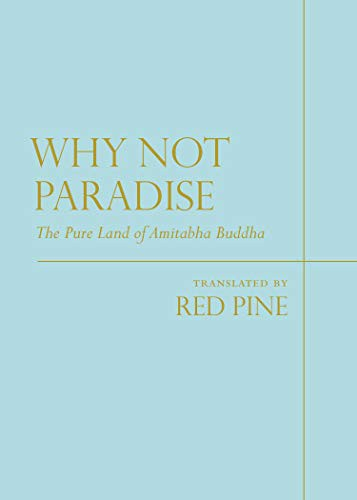Why Not Paradise: the Pure Land of Amitabha Buddha
Why Not Paradise: the Pure Land of Amitabha Buddha
$16.95
In stock, will ship in 2 – 3 business days
ISBN / SKU
9780912887845
Format
Paperback
Pages
64
Dimensions
172 x 122
Category/ies
Description
Of all the Buddhists in China, Japan, and Korea, the vast majority follow teachings centered on rebirth in the Pure Land, or Western Paradise, of Amitabha Buddha. All Buddhist sutras are about the mind, the mind and the Buddha, and about reducing, if not eliminating, the apparent distance between the two. What the authors of the first Pure Land texts added was a stage on which that drama could take place. Their choice was an enclosed garden similar to the kind Persians called pairi-da?za- based on Biblical accounts of the Garden of Eden and from which we get the word 'paradise.'
When Buddhists decided to imagine a better place to practice, it's not surprising they would conjure such a place, a place where devotees could return to Buddhist basics, a place no more than a thought away.
In this small chapbook, Red Pine presents new translations of two of the three sutras sacred to Pure Land Buddhists and has added a preface and footnotes to help readers better understand this spiritual path followed by hundreds of millions of people in the world today.
ABOUT THE AUTHOR
Bill Porter, who translates under the name Red Pine, was born in Califoria and grew up in Northern Idaho. After a tour of duty in the US Army, he attended UC Santa Barbara and majored in Anthropology. He recieved his graduate degree at Columbia University and studied with a faculty that included Margaret Mead and Ruth Benedict. He became interested in Buddhism, and in 1972 he left America and moved to a Buddhist monastery in Taiwan. After more than three years with the monks and nuns, he struck out on his own, supporting himself by teaching English and by working as a journalist at English-language radio stations in Taiwan and Hong Kong. During this time, he married a Chinese woman, with whom he has two children, and he began working on translations of Chinese poetry and Buddhist texts. In 1993, he returned to America so that his children could learn English. For the past twenty years, he has worked as an independent scholar and has supported himself from book royalties and lecture fees. During this time, he has lectured at many of the major universities in the US, England and Germany where he has lectured on Chinese history, culture, poetry, and religion. His translations of texts dealing with these subjects have been honored with a number of awards, including two NEA translation fellowships, a PEN translation award, the inaugural Asian Literature Award of the American Literary Translators Association, a Guggenheim Fellowship, which he received to support work on a book based on a pilgrimage to the graves and homes of China's greatest poets of the past, which was published under the title Finding Them Gone in January of 2016, and more recently in 2018 the Thornton Wilder Prize for Translation bestowed by the American Academy of Arts and Letters. His translations include WHY NOT PARADISE (Empty Bowl, 2019), STONEHOUSE'S POEMS FOR ZEN MONKS (Empty Bowl, 2019), CATHAY REVISITED (Empty Bowl, 2019), A DAY IN THE LIFE (Empty Bowl, 2018), and P'U MING'S OXHERDING PICTURES AND VERSE (Empty Bowl, 2015).
When Buddhists decided to imagine a better place to practice, it's not surprising they would conjure such a place, a place where devotees could return to Buddhist basics, a place no more than a thought away.
In this small chapbook, Red Pine presents new translations of two of the three sutras sacred to Pure Land Buddhists and has added a preface and footnotes to help readers better understand this spiritual path followed by hundreds of millions of people in the world today.
ABOUT THE AUTHOR
Bill Porter, who translates under the name Red Pine, was born in Califoria and grew up in Northern Idaho. After a tour of duty in the US Army, he attended UC Santa Barbara and majored in Anthropology. He recieved his graduate degree at Columbia University and studied with a faculty that included Margaret Mead and Ruth Benedict. He became interested in Buddhism, and in 1972 he left America and moved to a Buddhist monastery in Taiwan. After more than three years with the monks and nuns, he struck out on his own, supporting himself by teaching English and by working as a journalist at English-language radio stations in Taiwan and Hong Kong. During this time, he married a Chinese woman, with whom he has two children, and he began working on translations of Chinese poetry and Buddhist texts. In 1993, he returned to America so that his children could learn English. For the past twenty years, he has worked as an independent scholar and has supported himself from book royalties and lecture fees. During this time, he has lectured at many of the major universities in the US, England and Germany where he has lectured on Chinese history, culture, poetry, and religion. His translations of texts dealing with these subjects have been honored with a number of awards, including two NEA translation fellowships, a PEN translation award, the inaugural Asian Literature Award of the American Literary Translators Association, a Guggenheim Fellowship, which he received to support work on a book based on a pilgrimage to the graves and homes of China's greatest poets of the past, which was published under the title Finding Them Gone in January of 2016, and more recently in 2018 the Thornton Wilder Prize for Translation bestowed by the American Academy of Arts and Letters. His translations include WHY NOT PARADISE (Empty Bowl, 2019), STONEHOUSE'S POEMS FOR ZEN MONKS (Empty Bowl, 2019), CATHAY REVISITED (Empty Bowl, 2019), A DAY IN THE LIFE (Empty Bowl, 2018), and P'U MING'S OXHERDING PICTURES AND VERSE (Empty Bowl, 2015).
Reviews

